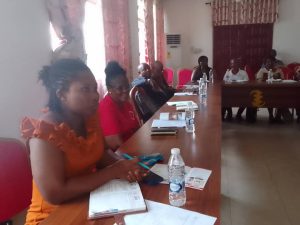The Apex body of Women in Poultry Value Chain (WIPVaC) with support from Star Ghana Foundation has held a planning meeting for stakeholders in the livestock sector to develop a roadmap for the implementation of biosecurity on farms.
The roadmap is expected to be presented to the Ministry of Food and Agriculture (MoFA) and Food and Agriculture Organization (FAO).
The National President of WIPVaC, Dr. Victoria Norgbey, stressed that the implementation of the biosecurity on the livestock farms will greatly impact the quality of production of livestock for the Ghanaian market.
Women in Poultry Value Chain, biosecurity, WIPVaC, Star GhanaThe certification will enable the insurance and financial institutions to lower the risk level when farmers are accessing these products. and we ourselves will have efficient production and maximize profit as well as adequately meet the protein needs of the country.”
“Now we have a roadmap that we can use for advocacy, engage with the policy makers and duty bearers,” she sounded happy.
The Agribusiness consultant on the project, Joseph Wise Seyram Klu, noted that after the acceptance of the roadmap by stakeholders, it will be validated which will then be followed by sensitization of all stakeholders.
After which there will a pilot implementation of the guidelines to address any grey areas before it will be rolled out across the country,” he observed.

He further stressed that “Without biosecurity, the farmers are losing a lot and we the consumers too are at risk of consuming unwholesome animal products. Generally, it’s a public health issue.”
The consultant is also preparing a training manual towards the implementation of the biosecurity certification guidelines.
Speaking with a participant, Dr. Florence Vanderpuye of Rosh Pinnah Ventures, a PGS certified Organic Farmer, she noted that the meeting has afforded the stakeholders the opportunity to know when the roll out will happen for stakeholders to prepare their farms to conform to the standards that have been expressed over the years concerning biosecurity and the benefits that farmers will enjoy when it is finally rolled out.
Implementation of the biosecurity certification will give us the satisfaction that should there be an outbreak, one can be assured of compensation because the farm is satisfied. And if a farmer wants an insurance cover, the certification makes the process much easier because there’s safeguard measures implemented on the farm,” she observed.
She added that securing financial assistance from the banks will also be become less stressful due to the implementation of biosecurity measures and certification of the farms.
Dr. Abdul Razak Okine, Deputy Director of Animal Production Directorate-MoFA, on his part, intimated that, prior to the roadmap planning meeting, the ministry has engaged in extensive consultation with stakeholders and “so far so good”.

He was however worried that “Most of the farms in the country have poor biosecurity, especially the small and medium scale farms do not have a footbath to control disease spread,” Dr. Okine lamented.
Present at the planning meeting were Veterinary services, MofA, FAO, Aquaculture, cattle, snail farmers, FAO, fish farmers, poultry farmers.
Background
The Livestock Development Policy and Strategy for Ghana was introduced in 2016. Even so, farms are still being attacked by poultry diseases like Gumboro, Newcastle, and Chronic Respiratory Disease. Due to this, the government spent over GHc17 million to compensate livestock farmers for killing about 554,638 poultry birds due to avian influenza outbreaks
The Ghana Livestock Development Policy and Strategy has not yet begun due to lack of action plan and funding and the veterinary services and animal improvement bills have not yet been introduced to Parliament. Also, the Agricultural Extension Agents (AEAs) and livestock farmers in Ghana lack access to biosecurity checklists for their use. With this, a document has been drafted for poultry bio-certification and is awaiting approval.
As a result of the AEA and health officers' lack of enforcement, many livestock farmers do not adhere to the biosecurity protocol and they get away with it easily. The biosecurity protocol isn't always followed by livestock farmers because the AEA and health officials don't enforce it. These farmers escape punishment because of inefficient enforcement agencies, operational difficulties, and a lack of coordination between the agricultural and health departments.
Issues like lax biosecurity enforcement and a lack of bio certification for livestock farms were addressed in the Ghana Livestock Development Policy and Strategy. The policy acknowledges that the Diseases of Animals Act needs to be updated and is out of date.
To increase productivity through regulation, the Ministry of Agriculture has committed to ensuring that veterinary medications are of the proper quality and quantity and are administered in accordance with producer recommendations. By 2021, it also promised to reach all clusters of livestock production, including smallholder farmers in underdeveloped areas, but this has not been done yet.
An alternative policy raised by the stakeholders was that, regulations for routine livestock movement are to be implemented in order to stop the spread of agents that might cause disease since routine livestock movement permits are not mentioned in the Ghana Livestock Development Policy and Strategy 2016.


Comments